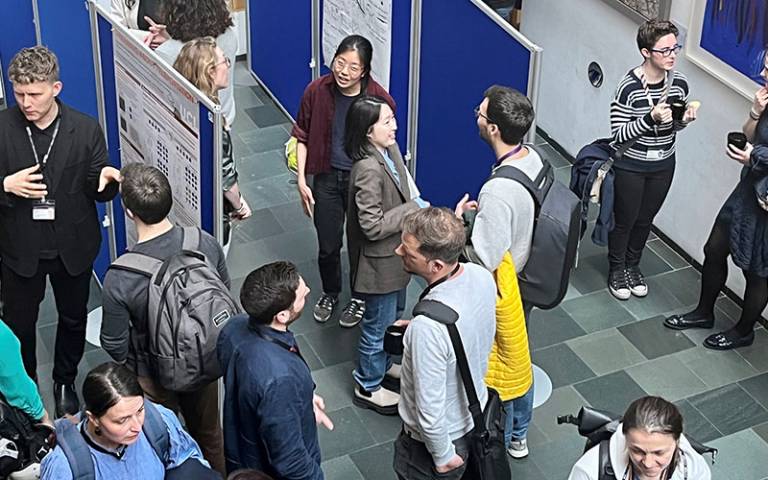Energising the ECR community, with the FLS Festival of Research
Researchers from across UCL’s Faculty of Life Sciences gathered for an all-day Festival of Research, creating cross-departmental connections and reinvigorating the FLS community.

6 December 2023
The Festival of Research was conceived as an opportunity to provide opportunities for researchers to engage with each other in the same physical space. This was due to recognition that in a post-pandemic environment, live interaction has never been more important – especially for early career researchers.
Dr Marc Amoyel, junior group leader and event organiser, explained: “There’s a lot of people who started either just before or during COVID. And at the point where usually you’d be exploring the faculty, finding out which colleagues you want to talk to and collaborate with...a lot of people were denied that, because everything was shut down. We needed to get people together, because really, a lot of science happens that way.”
Marc’s co-organiser, Dr John Labaddia, adds: “Not just in UCL, but in research environments across the world, connections had dissolved and been lost.”
Marc and John were asked by the Faculty of Life Sciences (FLS) Vice-Dean of Research, Steve Wilson, to organise the event. Professor Wilson wanted the event to be designed and hosted by early career researchers, and Marc and John’s experiences running a network of research fellows made them ideal candidates. He tasked them with creating a day that would ‘celebrate the world-class research at FLS, strengthening existing interactions and fostering new collaborations across the faculty.’
Something for everyone
Marc and John’s first task was to create an organising committee that would represent the proliferation of backgrounds and career stages across all six divisions of the faculty. With Professor Wilson’s help and UCL-wide connections, Marc and John quickly assembled a committee that would ensure that all voices would be heard.
“As a committee, we wanted to make sure our speakers represented a wide range of research areas and backgrounds. We asked each division to nominate a number of early group leaders (within their first five years) and postdocs to speak – and also to be mindful of wider inclusivity around gender, background, things like that.”
One of the trickier tasks facing the committee was choosing a keynote speaker. John says: “We sat down and bounced names around. We were looking for well-known individuals with links to UCL, who were still active and engaged in their research, preferably with a scientific policymaking track record."
The committee eventually chose a keynote speaker and topic that would resonate with the concept and purpose of the day – Professor Mark Miodownik, who is the Director of the Institute of Making and a published author who’s appeared on BBC TV and radio on multiple occasions. Professor Miodownik’s talk was titled, ‘Why working outside your discipline makes you a better and happier scientist.’
Sowing the seeds, face-to-face
With activities across two floors of the Great Ormond Street Institute of Child Health, the event on 03 May 2023 was a huge success.
At the panel discussion about the future of scientific publishing, attendees were invited to ask questions of representatives from The Company of Biologists, Nature Communications and UCL Press. PhD students and researchers were invited to showcase their work through posters and by submitting research images, and attendees voted to decide which image and poster would receive a £100 prize.
In addition to flash talks by junior group leaders and postdocs, there was also a science speed networking event, where attendees would mingle in randomly assigned groups for five-minute periods over the course of one hour. With each new group, individuals would introduce themselves and their work as a way to break the ice and meet new people.
Lunch and refreshments were provided for everyone, supported by Research Culture funding. Attendees were enthusiastic in their feedback, with comments like ‘well organised, energising and interesting’, ‘well-planned and fast-paced', ‘thoroughly enjoyable’, and ‘great people, great science’.
Following on from the event’s popularity, the Faculty of Life Sciences has decided to repeat the Festival of Research every two years, to help maintain a healthy, collaborative research community. While John and Marc acknowledge the immediate positive responses to the festival, there’s also an understanding that the full benefits of nurturing research communities often make themselves felt over a longer timescale.
“These things take time to brew. You see some work you like, or hear about a technique you like, then you get to interact with that person or group. It develops over time – it's both a strength and a weakness of research culture that things tend to go quite slowly,” says John.
He was also keen to stress the importance of the social aspects of in-person gatherings like this. “Having people in the same physical space to spontaneously bounce ideas around is super important. This was a physical event that really helped build connections.”
“We needed to get people together, because really, a lot of science happens that way.”
- Dr Marc Amoyel, Faculty of Life Sciences“
More information
About research culture
UCL’s Research Culture programme is developing a fair, collaborative and inclusive research culture, where both our research and research community can thrive. We work with UCL’s research community to support and deliver change against our 10-year Research Culture Roadmap.
Photo credit: Sonia Sanchez
 Close
Close

